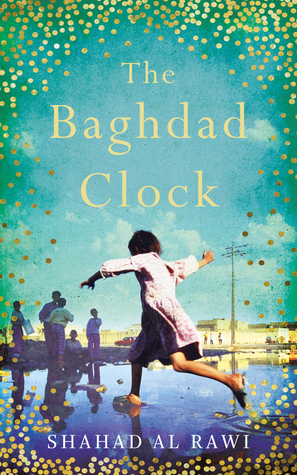It's hard for me to describe The Baghdad Clock, written by Shahad Al Rawi and translated from Arabic by Luke Leafgren. Generally speaking, I liked the novel. It's not the sort of book that necessarily excels at every technical beat, but it does a reasonable job at enough different things that the end result is a good book. The writing style is very straightforward, though sometimes a little old-fashioned in a combination that didn't always work for my taste. Pretty much everything about the book is solid, but that's also a little bit of what made me a little cooler toward it in the end; it didn't spark particularly strong emotions in me in one way or the other.
At its core, The Baghdad Clock is a coming-of-age story. This is the part that felt undersold in the marketing - it felt at times like The Baghdad Clock was being framed as more political/about war than it actually is. Which is not to say that the book isn't political (it covers some serious ground), rather that my initial reading of the blurb leaned more towards a "war story" than "girlhood" story. It ends up being a little bit of both. While there is little of the Gulf War in the book itself, its shock-waves clearly felt throughout the narrator's childhood. Moreover, the back half of the book settles into more recent Iraqi wars and turbulence. It's still not an explicit war story, but it lives in themes of war, sanctions, and uneasy peace.
Even so, the coming-of-age narrative remains dominant. Like many books of this sort, the book skips along through childhood relatively quickly, slowing down for the narrator's teenage years and early adulthood. It's important to note that while the narrator is unnamed, she is very much our guide within this story. Not only does she filter her best friend Nadia's stories through her own experiences, the narrator also tells of her neighborhood at large. As the story progresses, she humanizes her neighborhood more and more, almost as though it itself is a living character in her story.
By the novel's end, we definitely feel that we've encountered the world through the eyes of a specific girl (our unnamed narrator), but also that we've met her friends and neighbors. She remains somewhat elusive, though. The narrator shares bits of her budding romance with a neighborhood boy, but we learn little about her family life or even much about her personal aspirations. This too may have influenced how I felt about the book overall; I felt like the narrator was someone I just spent hours with, without really knowing who she was. A huge part of reading for me lies within the personal connection. Here, The Baghdad Clock almost explicitly sought to keep some distance between reader and main character. It's something I imagine won't bother most readers as it did me, but it still affected how I read the book.
But like I said: Pretty much everything about the book is... solid. The pacing is good. The way Al Rawi builds and populates her neighborhood is good. The way the story sometimes feels entirely real and sometimes just a little bit otherworldly is good. (This was actually one of my favorite touches and I would have been happy to have some more almost-fantasy in the story.) The story is interesting, the characters are solid, and the writing is fine. It's the sort of book I'd passively recommend, if it comes up. It might not make my "favorites" list any time soon, but I think readers are largely in for a good read.


No comments:
Post a Comment
Anonymous comments have been disabled due to an increase in spam. Sorry!